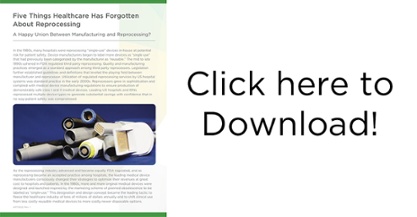5 Things Healthcare Has Forgotten About Reprocessing
Death by Integration
In the late 2000s, reprocessing was hailed as the foremost supply chain strategy for reducing costs and optimizing value, and clinicians and administrators actively defended their right to reprocess. Reprocessors were closely partnered with hospitals to help maximize the impact of reprocessing programs, and leading hospitals used reprocessing in their corporate image strategies to demonstrate a commitment to better patient care and the environment. This Hospital-Reprocessing coalition was very effective, and reprocessing savings nationally, as well as at the hospital level, grew substantially year after year.
In 2010 and 2011, medical device manufacturers bought out the two largest reprocessors in an ultimate “stamp of approval” that reprocessing is a legitimate solution to maximizing the value of the device purchase. The inherent vision in these acquisitions was that reprocessing programs and medical device sales could work side by side – a vision that was at the same time defensive and offensive: Offensively, the combination could provide better value to the hospital and at the same time secure or grow market share for the manufacturer. Defensively, the manufacturer placed itself in a position where it could control every aspect of device utilization, including which reprocessed products to provide and at what price.
Some hospitals have seen their reprocessing savings reduced to 50% or less of the savings they achieved in the late 2000s.
However, this “integration” of reprocessing into manufacturing has largely had the opposite effect. Since 2010, growth in reprocessing has slowed and expansion of the industry into new product categories has been virtually non-existent.
Hospitals have witnessed this change in the reprocessing industry, and many of them talk about never seeing reprocessing professionals in the hospital, lack of new 510(k) clearances, and reduced savings due to lack of program management. Some hospitals have seen their reprocessing savings reduced to 50% or less of the savings they achieved in the late 2000s. Here are five important things Healthcare has forgotten about Reprocessing:
- It’s not enough to have a contract - reprocessing needs to be managed to produce results
- Collecting does not save money
- Without new reprocessing 510(k)s, the hospital will lose savings
- It’s not about the price of the device, it’s about the program savings results
- It starts with collections – and grows with program reviews
Click below to discover Innovative Health's latest white paper, 5 Things Healthcare Has Forgotten About Reprocessing




